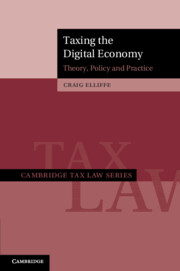Book contents
- Taxing the Digital Economy
- Cambridge Tax Law
- Taxing the Digital Economy
- Copyright page
- Dedication
- Contents
- Figures
- Preface
- Acknowledgements
- Part I
- Part II
- 5 The OECD Secretariat’s and Inclusive Framework’s Proposals for Multilateral Reforms
- 6 Examining the Proposals for Multilateral Reforms
- 7 Implementing the Proposals for Multilateral Reforms
- 8 The Influence of Alternative Policy Strategies on the 2020s Compromise
- 9 Interim Solutions and Long-Term Reforms
- Index
8 - The Influence of Alternative Policy Strategies on the 2020s Compromise
from Part II
Published online by Cambridge University Press: 23 April 2021
- Taxing the Digital Economy
- Cambridge Tax Law
- Taxing the Digital Economy
- Copyright page
- Dedication
- Contents
- Figures
- Preface
- Acknowledgements
- Part I
- Part II
- 5 The OECD Secretariat’s and Inclusive Framework’s Proposals for Multilateral Reforms
- 6 Examining the Proposals for Multilateral Reforms
- 7 Implementing the Proposals for Multilateral Reforms
- 8 The Influence of Alternative Policy Strategies on the 2020s Compromise
- 9 Interim Solutions and Long-Term Reforms
- Index
Summary
This chapter analyses the two pillars of the Unified Approach and the Global Anti-Base Erosion Proposals in the light of alternative policy choices which were available to the OECD. These major alternative policy choices include destination-based cash-flow taxation, residual profit allocation by income, formulary apportionment and expanding the concept of permanent establishment. In each case these policies are explained and the advantages and disadvantages of the major policy discussed. Each policy is then analysed to see what it has contributed to the 2020s compromise and what further contribution it might make to international tax reform in the future.What emerges from this analysis is that key elements of the reform owe much to the destination basis of taxation present in the various alternative reform options and selectively adopted in particular by the Unified Approach in Pillar One.
Keywords
- Type
- Chapter
- Information
- Taxing the Digital EconomyTheory, Policy and Practice, pp. 263 - 304Publisher: Cambridge University PressPrint publication year: 2021

